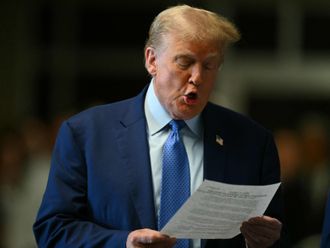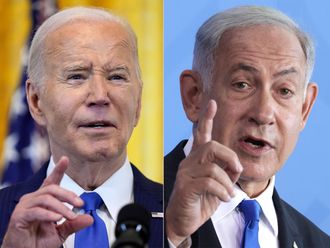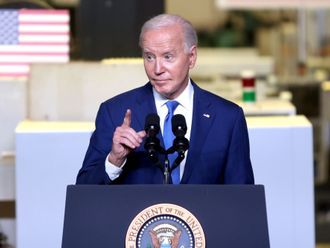Washington: Senate Republican leaders scrambled Sunday to rally support for their health care bill as opposition continued to build inside and outside Congress, and as several Republican senators questioned whether it would be approved this week.
President Donald Trump expressed confidence that the bill to repeal the guts of the Affordable Care Act would pass.
“Health care is a very, very tough thing to get,” Trump said in an interview shown Sunday on Fox News. “But I think we’re going to get it. We don’t have too much of a choice, because the alternative is the dead carcass of Obamacare.”
With Democrats solidly opposed to the legislation, Senate Republicans must find the votes from within. They can afford to lose only two votes, but five Republican senators have announced that they cannot support the health care bill as drafted, and others have expressed concerns.
Senate leaders have been trying to lock down Republican votes by funnelling money to red states, engineering a special deal for Alaska and arguing that they could insure more people at a lower cost than the House, which passed a repeal bill last month.
But as more analysis of the bill reached state officials, especially in places that expanded Medicaid access under the Affordable Care Act, misgivings grew. Sen. Bill Cassidy, R-La. and a doctor who is considered a critical vote, said he remained undecided. Louisiana, with its high levels of poverty, recently expanded Medicaid.
“There are things in this bill which adversely affect my state, that are peculiar to my state,” Cassidy said on CBS’ “Face the Nation.”
The bill was drafted in secret, mainly by the Senate majority leader, Mitch McConnell of Kentucky, who unveiled it on Thursday. McConnell wants a vote this week, before lawmakers take a break for the Fourth of July holiday.
Senator Jerry Moran of Kansas, usually a reliable vote for Senate Republican leaders, said on Fox News, “I just don’t know whether the votes will be there by the end of the week.”
Over the weekend, senators and their aides were poring over the bill, drafting possible amendments, preparing speeches and compiling personal stories from constituents whom they portrayed as either beneficiaries or victims of the Affordable Care Act.
But the bill’s supporters were battling an internal threat: reluctant Republicans. Sen. Ron Johnson of Wisconsin said Sunday that “there’s no way we should be voting” on the legislation this week. “No way.
“I have a hard time believing Wisconsin constituents or even myself will have enough time to properly evaluate this for me to vote for a motion to proceed,” Johnson said on NBC’s “Meet the Press.”
And Republican Sen. Susan Collins, said on ABC’s This Week: “It’s hard for me to see the bill passing this week, but that’s up to the majority leader. We could well be in all night a couple of nights.”
The US Chamber of Commerce, the National Federation of Independent Business and the National Retail Federation have all said they support the bill. Thomas J. Donohue, president of the Chamber of Commerce, said it would “help stabilise crumbling insurance markets” and eliminate “ill-conceived Washington mandates and taxes.”
But much of the nation’s $3 trillion (Dh11 trillion) health care industry opposes the bill. And McConnell has done little to woo the health care stakeholders whom President Barack Obama courted assiduously from his first months in office.
The concerns expressed by outside groups also appear to be growing. Top lieutenants in Charles G. and David H. Koch’s political network sharply criticised the legislation over the weekend, saying it was insufficiently conservative and did not do enough to rein in the growth of Medicaid. And a number of Republican governors have joined doctors, hospitals and patient advocacy groups in opposing the bill, in part because of its cuts to Medicaid.
McConnell has only a few days to wheel, deal and cajole reluctant senators to get behind legislation that has grown less popular with more exposure. He has considerable firepower to win votes by guaranteeing amendments that would address the concerns of individual Republican senators, and by playing on their loyalty to him and to conservative voters still demanding an end to the Affordable Care Act.
At the same time, Democrats say, he has striking liabilities. Trump has endorsed the bill, and Democrats say they will take every opportunity to link the legislation to an unpopular president.
And the Democratic wall of opposition is backed by less partisan voices. Senators are being flooded with appeals like this from the advocacy arm of the American Cancer Society: “Cancer is scary enough. Don’t take away our coverage.”
Five Republican senators have announced that they cannot support the bill as drafted: Dean Heller of Nevada, who says it cuts coverage too deeply, and four conservatives — Rand Paul of Kentucky, Ted Cruz of Texas, Mike Lee of Utah and Johnson — who say it does not do enough to lower health costs. Other Republicans, like Collins and Sen. Lisa Murkowski of Alaska, have expressed misgivings, and Sen. Ben Sasse of Nebraska declined to say Sunday how he would vote.












